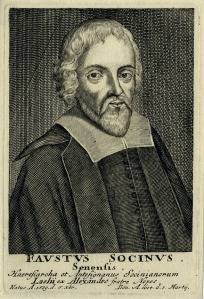When philosophical analytic becomes the mode and method of particular theologians and exegetes, historically what we end up with is something like a Socinianism. In the following Richard Muller explicates, a bit, on what a Socinianism entails. In his context he is, of course, engaging with how the Socinians related to the Post Reformed orthodox;  particularly in regard to the Socinians’ penchant to reject the Trinity on the grounds of being biblically fiducial over-against, as they would see it, slavishly bound to catholic Church teaching. I want to highlight this movement, once again, in this post, because Socinianism is never far away for those of us in the evangelical enclaves. Evangelicals, often, because of their ‘free-church-spirit’ end up taking that sense of liberty to the breaking points of its ostensible reaches. Faustus Socinus, and his followers, represent the mood that often characterizes the ‘feeling’ that many evangelicals have when it comes to ‘their Bibles’ vis-à-vis Church tradition. Here is Muller:
particularly in regard to the Socinians’ penchant to reject the Trinity on the grounds of being biblically fiducial over-against, as they would see it, slavishly bound to catholic Church teaching. I want to highlight this movement, once again, in this post, because Socinianism is never far away for those of us in the evangelical enclaves. Evangelicals, often, because of their ‘free-church-spirit’ end up taking that sense of liberty to the breaking points of its ostensible reaches. Faustus Socinus, and his followers, represent the mood that often characterizes the ‘feeling’ that many evangelicals have when it comes to ‘their Bibles’ vis-à-vis Church tradition. Here is Muller:
The problem of antitrinitarian exegesis was, certainly, the most overtly intense of the issues faced by the Reformers and their successors, given the Protestant emphasis on the priority of the biblical norm. For the various antitrinitarians consistently rejected tradition in the name of their own exegesis of Scripture. In addition, in the seventeenth century, there was a partial coincidence, given the textual problems of such texts as 1 John 5:7 and 1 Timothy 3:16, between the Socinian position and the views of various text-critical scholars. The orthodox found themselves in the very difficult position of arguing a traditional view of the Trinity against an antitrinitarian exegesis that appeared, in a few instances, to represent the results of text criticism and, in a few other instances, to represent a literal exegesis of text over against an older allegorism or typological reading — at the same time that, in many of its readings, it appeared to be a contorted and rationalizing attempt to undermine not only the traditional but also the basic literal sense of the text. This latter characteristic of Socinian exegesis cut in two directions: on the one hand, it could be presented, as was typical of the Socinian argumentation, as on a par with the text-critical results used in the Socinian reading of other passages, giving warrant to the antitrinitarian reading at least by association; on the other hand, it could be seen as an excessive result of the newer hermeneutical approaches, creating and otherwise unwarranted suspicion of certain kinds of textual criticism on the part of the orthodox. In either case, the orthodox task of building the primary justification of the doctrine of the Trinity on exegesis was made more difficult.
There were, therefore, three basic issues to follow in the discussion of the trinitarian thought of the Reformers and the Reformed orthodox — namely, the careful use of a well-defined patristic vocabulary, increasingly tuned to the particular needs and issues of Reformed thought, the intense battle over the exegetical ground of the doctrine in both testaments in view of the biblicistic assault on the doctrine from the Socinians and other antitrinitarians, and the struggle to find a suitable set of philosophical categories for the understanding and explanation of the doctrinal result, given the alteration or at least the fluidity of the conception of substance. At the heart of these lay the exegetical issue, given the Reformation emphasis on the priority of Scripture over all other norms of doctrine and alteration of patterns of interpretation away from the patristic and medieval patterns that had initially yielded the doctrine of the Trinity and given it a vocabulary consistent with traditional philosophical usage.[1]
The Trinity, the hypostatic union of Jesus Christ, is taught in Holy Scripture. The early church councils understood this, and sought to provide a grammar for said teaching, in ways that might help to provide intelligible ways to worship God for the Church; but then also, the grammar was built in order to counter the early heretics of the Church’s reality and teaching vis-à-vis Holy Scripture. It is a false dilemma to place Scripture against Church tradition, and vice versa. What ought to be determinative is how these things are understood within a properly delineated Christian dogmatics, and its resident ontology. The Socinians didn’t think Scripture had an ontology other than a wooden-rationalist one that funded their reception and thus reading of Scripture. Don’t be a Socinian.
[1] Richard A. Muller, Post-Reformation Reformed Dogmatics: Volume Four: The Triunity of God (Grand Rapids, MI: Baker Academic, 2003), 62.